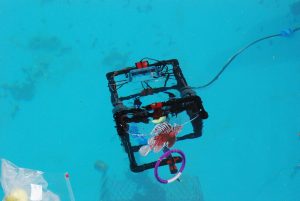Summer 2013 – Education Spotlight
– June 7, 2013
(From Summer 2013 Newsletter)
Deep-C Technology Experiences Bring Science to Life for Students
Education specialists and scientists with the Deep Sea to Coast Connectivity in the Eastern Gulf of Mexico (Deep-C) research consortium have multi-year efforts working with K-12 teachers and students and with university students across their consortium.
At Dauphin Island Sea Lab (DISL) this March, teams from six high schools in Florida competed in the first annual Deep-C Remotely Operated Vehicles (ROV) student competition. The high school student teams competed in a series of tasks, including one that tested the maneuverability of the vehicles and another that tested the operator’s ability to identify marine organisms through a mounted camera. After the competition, students presented their design process and answered questions from scientists and engineers about their projects.
Dr. Tina Miller-Way, Chair of DISL’s Discovery Hall Programs for Education and Outreach, explained that ROVs were chosen for this program because they have become an integral part of ongoing undersea research. She added, “ROVs are a great way to integrate technology, current Deep-C research and important concepts in STEM (science, technology, engineering and math) fields and also excite students.”
A group of undergraduate students from Florida A&M University and Florida State University (FSU) are working on a project to enhance oil spill detection. “This team of engineering seniors is fabricating an experimental radar unit that will be used to measure oil thickness under laboratory conditions,” explains Dr. Ian MacDonald, Professor of Oceanography in the Department of Earth, Ocean and Atmospheric Science at FSU and an advisor to the group. MacDonald describes the benefit of their work; “this will help to calibrate satellite measurements and could lead to the development of field instruments.”
Dr. Oscar Garcia-Pineda, a geophysicist at FSU and an advisor who works closely with the group further explains the importance of these students’ experiment, “the project has the potential to significantly improve coordinated response operations during an oil spill.” Dr. Garcia-Pineda explained that the ability to validate lab measurements with the satellite data could provide valuable information to crisis responders such as the U.S. Coast Guard and NOAA.
The Deep-C Coordinator Tracy Ippolito describes the inter-connectivity of Deep-C research and education, “the nature of the Deep-C project – the issues involved in understanding and protecting ecological communities in the Gulf of Mexico – provides rich opportunities for engagement with K-12 teachers and students and with college-level students.” Ippolito continues, “we can help promote science education in tangible ways, and share some of the wonder and awe of scientific discovery.”
Click on these links to read more about the:
Adapted from a longer article. Original article published here.







